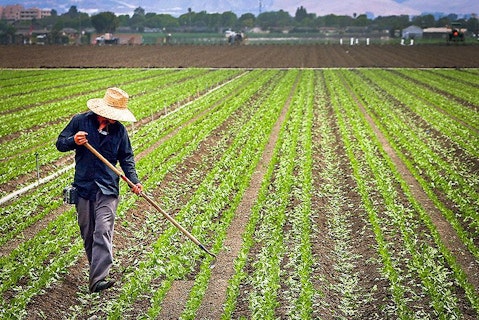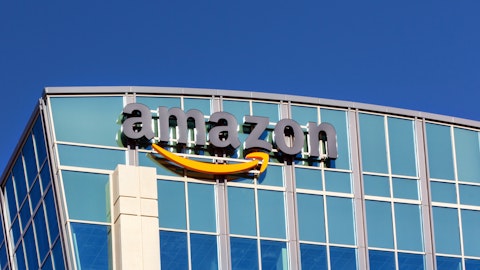In this article, we will discuss the 7 Best Organic Food and Farming Stocks To Buy.
The farming and organic food industry is essential in meeting global food demand while catering to the growing preference for healthier and sustainable options. Despite challenges like fluctuating costs and climate change, the sector benefits from trends such as increased organic food consumption and alternative proteins.
Sector Performance
The broader market had a strong performance in 2024, largely driven by technology stocks in the first half, resulting in a roughly 16% (year-to-date) YTD increase. However, future performance remains uncertain due to ongoing market volatility.
In 2022, inflationary pressures in the U.S. reached a peak, fueled by rising input costs for commodities, transportation, and labor. Since then, inflation has gradually decreased, providing relief for businesses across sectors. Inflation continues to ease as the annual inflation rate slowed for a fifth consecutive month to 2.5% in August 2024, the lowest since February 2021. This has led to lower feed costs, improving margins in the agriculture industry. The sector is also experiencing stable poultry production, slight gains in pork, and challenges in herd recovery due to constraints in the beef industry, resulting in higher retail beef prices.
While alternative proteins remain an essential, yet small component in meeting global demand, their sales have recently contracted. Despite this setback, reduced access to capital infusions has benefited the sector by filtering out weaker products, resulting in stronger business plans with a clear focus on profitability.
Overall, food and farming companies are still grappling with the lingering effects of high inflation, particularly elevated commodity prices, as the ‘Farm Products’ sector has underperformed with a 7.80% YTD decline. Although consumer spending has remained stable, households have shifted toward a “value-driven” mindset, prioritizing affordability in response to the rising cost of living.
Agriculture Market
According to the Business Research Company Report, the agricultural sector is poised for robust expansion in the coming years. Projections indicate the market will reach $19,286.79 billion by 2028, growing at a compound annual growth rate (CAGR) of 7.7%, according to The Business Research Company.
Even the agricultural sector hasn’t been able to escape the impact of the ongoing AI revolution as farmers in the US are increasingly adopting AI to address key challenges like labor shortages and climate unpredictability. Technologies such as drones, self-driving tractors, and AI-driven crop management tools are helping farmers maintain productivity and profitability in an industry facing workforce declines and increasing costs. These innovations not only improve productivity but also help reduce expenses by optimizing resource use and enhancing efficiency across farming operations. AI is poised to transform agriculture, helping farmers “do more with less” and meeting the world’s growing food needs.
Organic Food Market
Organic food sales in the United States in 2022 broke through the $60 billion mark for the first time, hitting another high-level mark for the resilient organic sector. Total organic sales – including organic non-food products – were a record $67.6 billion, according to the 2023 Survey by the Organic Trade Association.
However, this market is also facing challenges, such as the shorter shelf life of organic products due to the absence of preservatives. According to Lending Tree, inflation last year had a greater impact on organic food prices compared to conventional products. In that period, organic fruit and vegetable prices rose by 13.1%, while conventional counterparts saw a 9.9% increase. Similarly, organic chicken prices surged by 19.5%, compared to a 5.9% rise in conventional chicken prices.
The outlook for the organic food industry remains strong, fueled by rising consumer interest in sustainability and health. Organic sales have more than doubled in the past decade, surpassing $50 billion, with food sales reaching this mark in 2019. Despite challenges like economic fluctuations and supply chain disruptions, the industry’s focus on sustainability positions it for continued growth.
With this, let’s now move on to our list of the 7 Best Organic Food and Farming Stocks to Buy.

Pixabay/Public Domain
Methodology:
For this list, we scanned Insider Monkey’s database of Q2 2024 and selected companies involved in the organic food and farming industries, covering areas including but not limited to processing and distribution of agricultural, industrial, feed, and organic food products. From that group, we picked 7 companies with strong balance sheets and solid financials and ranked them in ascending order of hedge funds having stakes in them.
Why are we interested in the stocks that hedge funds pile into? The reason is simple: our research has shown that we can outperform the market by imitating the top stock picks of the best hedge funds. Our quarterly newsletter’s strategy selects 14 small-cap and large-cap stocks every quarter and has returned 275% since May 2014, beating its benchmark by 150 percentage points (see more details here).
7. Sprouts Farmers Market, Inc. (NASDAQ:SFM)
Number of Hedge Fund Holders: 35
Sprouts Farmers Market, Inc. (NASDAQ:SFM) is an American company that operates across various segments, including natural food stores and farmers markets, and maintains a strong presence in the Southwest US, particularly in California, Texas, Arizona, and Florida. Sprouts’ product range spans fresh produce, vitamins & supplements, beer & wine, grocery items, bulk foods, meat & seafood, bakery goods, body care products, and many more.
In Q2 2024, Sprouts Farmers Market, Inc. (NASDAQ:SFM) experienced a total sales surge of 12% year-over-year (YoY) to $1.9 billion, driven by a 6.7% increase in comparable store sales and contributions from new store openings. E-commerce sales rose by 30%, reflecting the company’s effective omnichannel approach and adaptability to shifting consumer behaviors.
In contrast, the Sprouts brand accounted for 22% of total sales, indicating strong customer acceptance of its offerings. Gross margin improved to 37.9%. Despite a $63 million rise in selling, general, and admin (SG&A) expenses, driven by strategic investments and new store costs, the company achieved a 32% increase in diluted EPS, reaching $0.94.
Moreover, Sprouts Farmers Market, Inc. (NASDAQ:SFM) ended the quarter with $177 million in cash and no outstanding borrowings under its credit facility. The company generated $311 million in operating cash flow and has $585 million remaining under its $600 million share repurchase authorization, indicating strong liquidity and growth potential.
Sprouts Farmers Market recently announced their plan to open a store in NoDa by the summer of 2025, filling a grocery gap in the rapidly developing neighborhood. This move underscores the company’s strategic expansion plan.
In terms of price movement, the stock saw a 2.85% rise over the past month and an impressive year-to-date return of over 107%, driven by robust performance, strategic investments, and expansion plans.
Notably, despite witnessing positive net income growth over the past five years, the growth is lower than the industry average of 14%. Moreover, Sprouts Farmers Market, Inc. (NASDAQ:SFM) doesn’t pay dividends, as it is reinvesting most of its earnings back into the business, suggesting that future growth may depend on continued successful investments.
As of Q2 2024, 35 hedge funds, holding a combined investment of $1 billion, are bullish on the stock, as per Insider Monkey’s database.
6. Nutrien Ltd. (NYSE:NTR)
Number of Hedge Fund Holders: 35
Nutrien Ltd. (NYSE:NTR) is a leading crop nutrient company involved in the production and distribution of agricultural, industrial, and feed products. It operates through four main segments: Retail, Potash, Nitrogen, and Phosphate. The Retail segment supplies crop nutrients, crop protection products, seeds, and other merchandise. The Potash, Nitrogen, and Phosphate segments focus on producing specialized chemical nutrients for their respective products.
Nutrien Ltd. (NYSE:NTR) reported a 13% drop in net earnings in Q2 2024, and a 12% decline for the first half of 2024, mainly due to lower fertilizer prices and a loss on foreign currency derivatives. Adjusted EBITDA also fell, driven by weaker fertilizer prices but partly offset by stronger Retail and Potash segment performance.
Now focusing on the segment-wise performance, Potash operations saw a reduction in per-ton costs to $53, thanks to automation and higher production. The nitrogen segment generated $1.1 billion in EBITDA, benefiting from decreased natural gas costs. Retail operations, on the other hand, saw a 17% rise in adjusted EBITDA to $1.2 billion, driven by improved gross margins across product lines.
From a liquidity perspective, Nutrien Ltd. (NYSE:NTR)’s cash balance rose to over $1 billion in Q2 2024 from $941 million in December 2023. The company further strengthened its liquidity by issuing $1,000 million in senior notes and reducing investment spending. Looking ahead, Nutrien expects a robust crop input demand in North America and Southeast Asia, supported by favorable affordability for potash and nitrogen.
On November 14, 2024, CoteX Technologies, a Canadian agricultural technology startup, and Nutrien announced a MOU to jointly explore the commercialization of a coating technology. This innovation aims to deliver an affordable, sustainable nitrogen fertilizer solution.
However, it’s important to make a note of the recent stock movement, as the company experienced a 2.40% stock price decline over the past month and a 17.75% decrease year-to-date (YTD). This is attributed to ongoing market instability in Brazilian operations. As part of the margin improvement plan, the closure of 21 selling locations and three fertilizer blenders aims to reduce operating costs and optimize cash flow.
As of Q2 2024, 35 hedge funds have invested $386 million in the company, as per Insider Monkey’s database, earning Nutrien Ltd. (NYSE:NTR) a spot on our list of Best Organic Food and Farming Stocks to Buy.
5. Performance Food Group Company (NYSE:PFGC)
Number of Hedge Fund Holders: 42
Performance Food Group Company (NYSE:PFGC) is a major foodservice distributor serving a diverse range of clients across the U.S. It operates through three segments: Foodservice, Vistar, and Convenience. Vistar’s Good To Go Program reflects PFGC’s focus on healthier eating, featuring over 1,800 natural and organic products, including options that are organic, non-GMO, vegan, and gluten-free, catering to growing consumer demand for cleaner, healthier food choices.
In the fourth quarter of 2024, Performance Food Group Company (NYSE:PFGC) saw its net sales increase by 2.2%, reaching $15.2 billion. It was bolstered by independent Foodservice and recent acquisitions, though partly offset by declines in the Convenience and Vistar sectors. Total case volume increased by 1.1% year-over-year (YoY), with a 0.7% rise in organic case volume driven by growth in independent cases and the Foodservice Chain business.
The quarter was marked by significant contributions from the recent acquisitions of Cheney Brothers and José Santiago. Therefore, net income saw a 10.9% increase, reaching $166.5 million, with an improved effective tax rate. Adjusted EBITDA surged 18.4% and adjusted diluted EPS rose 27.2% to $1.45.
Performance Food Group Company (NYSE:PFGC) improved liquidity by generating $1.2 billion in cash flow from operating activities, up from $832.1 million the previous year, thanks to improved working capital and higher operating income. Looking ahead, the company anticipates net sales of approximately $60 billion to $61 billion for the fiscal year 2025, with adjusted EBITDA between $1.6 billion and $1.7 billion. This outlook includes results from José Santiago but does not account for potential benefits from the proposed acquisition of Cheney Bros, Inc.
In May 2024, PFGC introduced direct-emissions-free transportation, advanced refrigeration technologies, and solar power at its Gilroy facility. These initiatives are crucial for achieving their sustainability goals and enhancing their environmental impact.
Notably, although Performance Food Group Company (NYSE:PFGC) posted an increase in revenues for the latest quarter, it missed the analysts’ estimates by 0.25%. Moreover, shares lost about 3% in the first half of the year, while the broader market gained 13.9% in the same period, signaling underperformance relative to the market.
Regarding stock performance, the company saw a 10.17% rise over the past month, largely attributable to synergies achieved from the recent acquisitions. As of Q2 2024, 42 hedge funds, holding a combined investment of $981 million, are bullish on the stock, as per Insider Monkey’s database.
4. Corteva, Inc. (NYSE:CTVA)
Number of Hedge Fund Holders: 43
Corteva, Inc. (NYSE:CTVA) provides seed and crop protection solutions in the agriculture and food supply sectors. It operates through two segments: Seed, which focuses on advanced germplasm and traits to boost farm yields, and Crop Protection, which offers products for pest and disease management, including nitrogen management and seed-applied technologies.
In Q2 2024, Corteva, Inc. (NYSE:CTVA) reported net sales of $6.1 billion and organic sales of $6.2 billion. This growth, driven by strong Seed performance and a modest rebound in Crop Protection volumes, marks an improvement from last year. The operating EBITDA margin increased by 248 basis points to 31.4%, highlighting the effectiveness of Corteva’s strategy to enhance its proprietary technologies and operational efficiency.
Notably, Corteva’s Seed business saw a 4% rise in organic sales for the first half of 2024, bolstered by strong pricing and broad gains. The launch of Pioneer brand Z-series soybeans, with a 2.7 bushel per acre yield advantage, has strengthened the company’s market leadership in North America’s corn and soybean sectors.
Corteva, Inc. (NYSE:CTVA) reported strong cash flow in the first half of the year. Free cash flow is expected to be approximately $1.75 billion, reflecting a conversion rate of around 50% of EBITDA. Additionally, it announced a 6.25% increase in its annual dividend, underscoring its confidence in its financial stability and future prospects.
On March 21, 2024, Corteva Agriscience launched Corteva Catalyst, a new investment arm within its R&D department aimed at accelerating the development of agricultural technologies. This hub will focus on investing in startups aligned with the company’s research priorities.
Corteva’s share price surged 7.52% in the past month and 15.68% year-to-date, fueled by strong financial performance, particularly from the seed segment.
However, the company’s future outlook includes some challenges, with lowered sales expectations due to product availability concerns, higher interest rates, and farmers deferring purchases. Crop Protection sales are expected to be impacted by these factors, signaling potential pressure on future revenue growth.
Of the 912 hedge funds tracked by Insider Monkey at the end of Q2 2024, 43 hedge funds have invested $1.1 billion in the company. Among these, Harris Associates has bought 14.2 million shares with a total value of $764 million.
3. Kellanova (NYSE:K)
Number of Hedge Fund Holders: 45
Next on the list is Kellanova (NYSE:K). With a legacy of over 100 years, it boasts iconic brands like Pringles, Cheez-It, Pop-Tarts, and RXBAR. It also includes Kellogg’s (international), Eggo, and MorningStar Farms. In 2023, Kellanova achieved net sales of over $13 billion and operates in 180 markets with around 23,000 employees. One of its brands, Pure Organic, offers organic, gluten-free, non-GMO Project Verified, and vegan snacks.
In Q2 2024, Kellanova (NYSE:K) reported net sales of $3,192 million, reflecting a 4% organic growth. Adjusted operating profit surged 16%, with gross profit up 9% YoY. Nigeria played a key role in the company’s performance, accounting for nearly all of the global volume decline, due to price elasticity impacts following Q1 price increases. The devaluation of the Nigerian Naira negatively affected net sales.
Despite these challenges, Nigeria contributed to 16% organic sales growth in the region through strategic pricing. EPS came in at $1.01, surpassing analysts’ expectations, marking a 14% growth from the previous year.
In terms of liquidity, Kellanova’s (NYSE:K) cash flow generation remained strong. The company experienced a YoY increase in free cash flow and maintained debt leverage below target. They also raised their free cash flow outlook to over $1 billion, driven by robust operating profit. Additionally, significant cash was returned to shareholders through dividends.
On August 14, an announcement was made that Mars would acquire Kellanova for $36 billion. This acquisition is set to transform Mars into a leading player in the global snacking market, expanding its presence in both sweet and savory categories. The deal is expected to be executed within the first half of 2025.
Kellanova’s share price surged 8.61% in the past month and 43.30% year-to-date, fueled by strong financial performance. It could also be partly linked to the use of AI, ML, and data analytics, which are optimizing operations and driving innovations like the Pringles Harvest Blends.
Declines in revenue, especially in Europe and Asia Pacific, were noted. Moreover, sales declined 4.7% YoY due to currency fluctuations and the divestiture of its Russia business. Despite these challenges, the company raised its 2024 guidance, signaling a positive outlook.
As of Q2 2024, 45 hedge funds, with a combined investment of $2.1 billion, remain bullish on the stock, as per Insider Monkey’s database. Considering the company’s performance and outlook, Kellanova is featured on our list of the Best Organic Food and Farming Stocks to Buy, despite analysts currently giving it a consensus hold rating.
2. The Kroger Co. (NYSE:KR)
Number of Hedge Fund Holders: 46
The Kroger Co. (NYSE:KR) is the largest supermarket chain in the U.S., operating an extensive network of grocery stores, pharmacies, and fuel centers. Offering over 1,500 unique items, Simple Truth, a private-label brand, provides products free from over 101 artificial colors, flavors, preservatives, and sweeteners. Simple Truth Certified Organic products are produced by USDA-accredited organic growers, free from synthetic fertilizers and genetic engineering.
In Q1 2024, The Kroger Co. (NYSE:KR) reported a 0.5% increase in identical sales without fuel, driven by higher household engagement and visits. The company reported net sales of $45.3 billion, compared to the same quarter last year. Digital sales grew by over 8%, reflecting successful investment in its digital infrastructure.
Gross margin was 22.4%, slightly down from last year due to lower pharmacy margins and increased price investments, but offset by a favorable product mix. A LIFO charge of $41 million, down from $99 million last year, indicated improved inflation expectations. The company reported an adjusted EPS of $1.43, surpassing analysts’ expectations of $1.35.
The Kroger Co. (NYSE:KR)’s strong free cash flow positions it well for growth, especially with merger preparations. The anticipated merger with Albertsons and the resulting synergies, alongside digital enhancements, suggest promising upside potential for the stock. By the end of the quarter, the company’s net debt to adjusted EBITDA ratio stood at 1.25, well below the target range of 2.3 to 2.5.
However, the share price saw a dip of 3.5% in the last month but surged 15.15% on a YTD basis. The 1-month adverse price movement could be attributed to the lawsuit filed by the Federal Trade Commission (FTC) to block the merger on February 26, 2024.
As of Q2 2024, 46 hedge funds, holding a combined investment of $4.1 billion, remained bullish on the stock, as per Insider Monkey’s database. The Kroger Co. (NYSE:KR) has made it to our list of Best Organic Food and Farming Stocks to Buy.
1. Albertsons Companies, Inc. (NYSE:ACI)
Number of Hedge Fund Holders: 59
Now, on our list of the 7 Best Organic Food and Farming Stocks to Buy, we have Albertsons Companies, Inc. (NYSE:ACI). Albertsons Companies is a leading food and drug retailer in the U.S. As of June 2024, the company operated 2,269 retail stores, including 1,725 pharmacies, across 34 states under well-known banners such as Albertsons, Safeway, and more. Albertsons also offers a wide range of USDA-certified organic products through its O Organics brand.
In Q1 2024, Albertsons Companies, Inc. (NYSE:ACI) reported net sales of $24.3 billion, a slight increase from $24.1 billion in the prior year, driven by a 1.4% rise in identical sales. Digital sales surged 23%, highlighting the company’s growing online presence. However, net income dropped to $241 million from $417 million due to the lack of a favorable tax benefit from Q1 2023. Gross margin was steady at 27.8%, but selling and administrative expenses rose to 25.9% of revenue, driven by higher wages, merger costs, and operational investments.
Albertsons Companies, Inc. (NYSE:ACI)’s liquidity improved with cash increasing to $291.1 million and reduced debt. The company invested $543 million in CAPEX, including 17 store remodels and a new location. Looking ahead, the company expects challenges from rising associate wages, increased lower-margin pharmacy and digital businesses, and cycling food inflation benefits.
On October 13, 2022, Albertsons Companies, Inc. (NYSE:ACI) announced the merger with Kroger. However, the FTC blocked the merger with a lawsuit on February 26, 2024. On September 6, 2024, the CEOs of Kroger and Albertsons defended the merger, arguing it would lower prices and enhance competition against retail giants like Walmart, Costco, and Amazon.
As for price movement, the company’s stock has declined 2.91% over the past month and 16.99% YTD. The drop is attributed to concerns over Kroger’s $24.5 billion acquisition deal. Trading below the $27.25 offer price indicates investor apprehension over regulatory challenges, especially lawsuits from the FTC and several states.
Despite this uncertainty, analysts view the stock as a compelling investment, with analysts projecting a 31.09% upside from the current price of $19.01. Additionally, 59 hedge funds, with a combined $4.2 billion investment, remain bullish on the stock as of Q2 2024, as per Insider Monkey’s database.
ACI is the Best Organic Food and Farming Stocks To Buy based on hedge fund sentiment. But our conviction lies in the belief that some AI stocks hold greater promise for delivering higher returns and doing so within a shorter timeframe. If you are looking for an AI stock that is more promising than NVDA but that trades at less than 5 times its earnings, check out our report about the cheapest AI stock.
READ NEXT: $30 Trillion Opportunity: 15 Best Humanoid Robot Stocks to Buy According to Morgan Stanley and Jim Cramer Says NVIDIA ‘Has Become A Wasteland’.
Disclosure: None. Insider Monkey focuses on uncovering the best investment ideas of hedge funds and insiders. Please subscribe to our free daily e-newsletter to get the latest investment ideas from hedge funds’ investor letters by entering your email address below.





